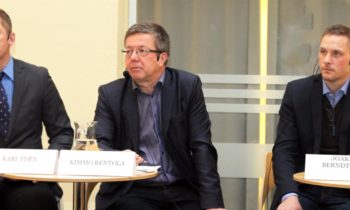 On the 24 November 2016, Joakim Berndtsson, Karl Ydén and Kimmo Rentola visited IFS to discuss why Sweden and Finland have not become NATO members.
On the 24 November 2016, Joakim Berndtsson, Karl Ydén and Kimmo Rentola visited IFS to discuss why Sweden and Finland have not become NATO members.
The conditions have long appeared auspicious for Finland and Sweden to make the jump from partnerships with the NATO alliance to actually submitting formal applications for membership. Ever since both countries joined NATO’s Partnership for Peace program in 1994, they have nurtured increasingly close security ties to the alliance. Both are considered “Gold Card” members, contributing substantially to NATO operations and participating in alliance training exercises. Seminar Chair Professor Magnus Petersson summarized this situation before a well-attended seminar at IFS, and invited a distinguished panel to tackle the question of why these two countries have not taken the final step to becoming members.
SWEDEN
Swedish public support for NATO membership has risen in recent years but the public remains committed to non-alignment, observed the scholarly team of Joakim Berndtsson, Senior Lecturer at the University of Gothenberg and Karl Yden, Senior Lecturer at Chalmers and Visiting Research Fellow at Kings College London. Sweden’s history of neutrality remains a powerful component of its national identity, even as the country has closely integrated its armed forces with NATO. For many, Sweden appears to be “more NATO than most NATO members” and has become as close a partner as possible without actually being a member of the alliance.
Public attitudes regarding NATO membership have, not surprisingly, reflected the evolving security situation in the region. Particularly after the “Russian Easter Incident” in 2013 – when a Russian military exercise simulated an attack on Sweden, causing NATO aircraft to respond while Swedish planes remained on the ground – public concerns about Russia have increased dramatically. Additionally, the Swedish government has declared that it would not remain passive if neighboring countries were threatened. Sweden has, in essence, shifted from a policy of non-alignment to one of close cooperation with its European partners. Paradoxically, however, the Swedish public is slightly in favor of NATO membership but also desires non-alignment. Of course, this is not a tenable position, but Berndtsson and Yden speculate that the lack of a public discussion about defense and security matters in Sweden has led to this complicated attitude among Swedes. Membership in NATO is not seen as a realistic possibility in the near-term.
FINLAND
The situation in Finland is not dissimilar, acknowledged Professor Kimmo Rentola of the University of Helsinki. Finland has contributed and cooperated closely with NATO since 1994, sending forces (as did Sweden) to Afghanistan under the aegis of NATOs International Security Assistance Force (ISAF). Finnish foreign policy elites and the popular media generally favor membership, whereas opposition rests among the more pacifist-focused left as well as centrist parties. The Finnish arguments for membership mirror those of Sweden, including security guarantees, existing cooperation and interoperability of the armed forces, and the threat from Russia to the east. Nordic Defense Cooperation has also been an important effort for both Sweden and Finland.
Just as in Sweden, however, the Finns have their own cultural attitudes and national identity that runs counter to alliance membership. Stretching back to the 1939-1940 Winter War, when Finland saw itself as fighting alone against the Soviet invasion (it actually had some assistance, Rentola points out), the Finnish people have retained a strong independent streak based on self-reliance. Support for membership has remained surprisingly steady at around 25-30%. There remains an intense willingness to defend the country, but this collective memory of fighting alone has given them a high degree of self-confidence and alliance membership has therefore not been considered necessary. Public opinion is therefore likely to remain steady, unless influenced by external changes such as a greater threat from Russia. A Swedish entrance into NATO that would leave Finland as the only Western non-member in the region might also affect attitudes toward alliance membership.
POIGNANT QUESTION
A number of excellent questions from the audience kept the panel busy. One questioner wondered why the Finns were so confident in going it alone since their military forces appear to be increasingly outdated – do they believe it be possible for the country to defend itself? Rentola acknowledged the futility of defending against a much larger Russian military, though no European country would be able to defend itself either. Many are in any case skeptical that a confrontation would be isolated to one country.
Another observed that there appears to be a movement inside the NATO alliance to close off some aspects of further cooperation with Sweden and Finland in order to force them into a decision on membership. What reaction might this inspire? Berndtsson replied that the answer would depend upon which political party was in the ruling coalition, and that limiting NATO partnership may cause Sweden to rely to an even greater degree on NORDEFCO or bilateral security agreements with the United States. An interesting discussion ensured as to the extent of bilateral security agreements constituting security guarantees (as it appears to have been sold to the Swedish public) and the explicit collective security arrangement of the NATO alliance.
The bottom line, all could agree, was that no one should expect membership applications from Sweden and Finland anytime soon. Nevertheless, the discussion raised a number of important points that deserved continued attention.
(Summary by Michael Mayer – forsvaret)
